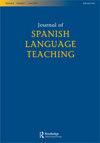Raciolinguistics and Spanish language teaching in the USA: from theoretical approaches to teaching practices
Q1 Arts and Humanities
引用次数: 0
Abstract
Raciolinguistic perspectives have moved to the forefront of educational linguistics, examining how the co-construction of race and language (re)produce damaging ideologies from broader societal constructs in the classroom and beyond. Raciolinguistic theory helps us to unravel the white supremacist foundations of language education and policy. In this paper, after outlining the theoretical underpinnings of a raciolinguistic perspective, we offer three examples of applied practice demonstrating the power of denaturalizing the co-construction of race and language in linguistics and language teaching through multidisciplinary approaches. While we resist peripheralizing the role of racialization in our experiences teaching the Spanish language and preparing language teachers, we argue that the incorporation of a raciolinguistic perspective in curricula across disciplines is beneficial to society. Through the examination of raciolinguistic ideologies and decolonial theory, we contend that all students can be empowered to reflect on their positions and experiences to build empathy as a means to reimagine new [linguistic] worlds.美国的种族语言学与西班牙语教学:从理论方法到教学实践
种族语言学的观点已经转移到教育语言学的前沿,研究种族和语言的共同建构如何从课堂内外更广泛的社会建构中(重新)产生破坏性的意识形态。种族语言学理论帮助我们揭开语言教育和政策的白人至上主义基础。本文在概述了种族语言学视角的理论基础之后,提供了三个应用实践的例子,展示了通过多学科方法使种族和语言的共同建构在语言学和语言教学中的力量。虽然我们拒绝在西班牙语教学和准备语言教师的经验中边缘化种族化的作用,但我们认为,在跨学科课程中纳入种族语言学观点对社会是有益的。通过对种族语言意识形态和非殖民化理论的考察,我们认为所有学生都可以被授权反思他们的立场和经历,以建立同理心作为重新想象新的[语言]世界的手段。
本文章由计算机程序翻译,如有差异,请以英文原文为准。
求助全文
约1分钟内获得全文
求助全文
来源期刊

Journal of Spanish Language Teaching
Arts and Humanities-Language and Linguistics
CiteScore
1.80
自引率
0.00%
发文量
11
期刊介绍:
The Journal of Spanish Language Teaching is a new peer-reviewed journal that provides an international forum for innovative research, methods, materials and theories on the teaching and learning of Spanish as a foreign language. The Journal''s main purpose is to create a dialogue between researchers and practitioners worldwide in order to enrich a discipline that is experiencing tremendous growth. The Journal invites contributions from researchers working on topics related to the teaching and learning of the Spanish language at any educational level and in any setting. The Journal will publish original research papers as well as book reviews. Periodically, it will also consider monographic issues and critical surveys of recent research related to a specific sub-discipline or geographical area. A thorough peer review process will be applied to both commissioned and unsolicited articles. The Journal of Spanish Language Teaching will constitute an essential journal of reference in the field. There is currently no other academic publication dedicated solely to the teaching and learning of Spanish, which exists in both print and electronic formats, and is global in its reach. Targeted at both academics and practitioners, the Journal aims to have a major impact on the discipline.
 求助内容:
求助内容: 应助结果提醒方式:
应助结果提醒方式:


